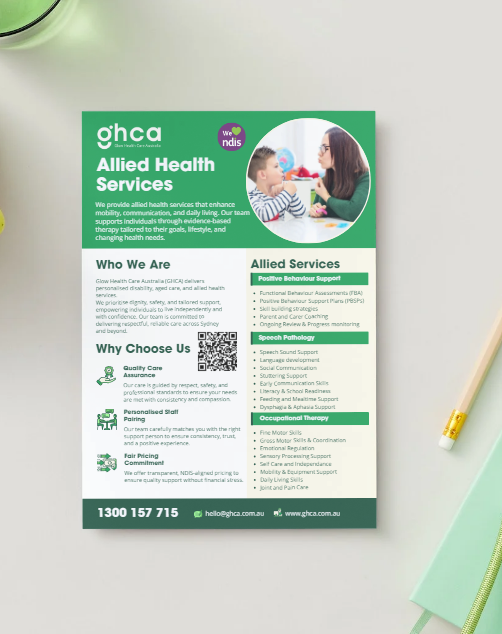Practical Support Through Therapy
Support for Wellbeing, Daily Living, and Independence
We offer therapy and support to help you manage daily tasks, build skills, and improve your health. After an initial assessment, we work with you to set goals and focus on what matters most in your day-to-day life.

(02) 8660 1936
hello@ghca.com.au
Level 3 Suite 1, 100 George St, Parramatta NSW 2150
Get the Support You Need to Live Well
Struggling with daily tasks, mobility, or communication? Our therapy team can help you build skills and achieve greater independence through NDIS-funded support.
Contact us today to discuss how we can assist you.

FAQs
Do you have any Questions
Here are seven frequently asked questions (FAQs) about Therapeutic Services
What types of therapy are covered by the NDIS?
The NDIS funds a variety of therapeutic services that help with daily living and capacity building. These include:
-
Occupational therapy, physiotherapy, speech pathology, psychology
-
Behavioural support, dietetics, exercise physiology, social work
These therapies are aimed at building skills for daily life and improving participation in community settings
Where does therapy funding come from in my plan?
Therapy is usually funded under:
-
Capacity Building – Improved Daily Living
-
Sometimes Improved Health & Wellbeing
Depending on your plan, core budgets might also cover certain therapy-related supports like meal planning or mobility training
How do I access therapy through NDIS?
-
Check your plan for therapy line items (e.g. OT, physio, speech).
-
Engage a support coordinator or contact providers directly.
-
Schedule an assessment and ongoing sessions.
NDIS concierge services and online directories like MyCareSpace help match you with suitable providers
Does the NDIS cover all mental health treatments?
The NDIS does not fund purely clinical or acute mental health treatments (e.g., diagnoses, medications covered by Medicare/PBS). It does fund psychosocial disability supports aimed at building skills for daily life, routines, and community participation when mental health significantly impacts function
What happens to services that get defunded (e.g., music or art therapy)?
Some supports, such as music therapy, have had funding restrictions under the NDIS. These services are only fully funded if they clearly help maintain or improve functional capacity. To help you plan better, GHCA will provide a pricing guide, so you understand what is covered and at what rate—ensuring you can make informed choices about the support you access.
Can I choose my community nursing provider?
Yes, you can choose from DVA-approved community nursing providers. A list of these providers is available on the DVA website.
How often can I receive community nursing services?
The frequency and duration of visits depend on your assessed clinical needs. Your community nursing provider will work with you to develop a care plan tailored to your requirements.
For more detailed information, please visit the DVA's official page on community nursing services.